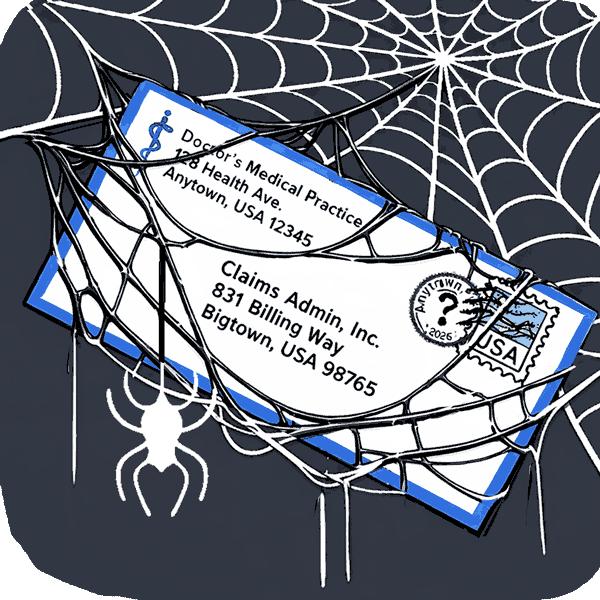Careworks Hurts Employers, Providers, and Payers

Employers buy workers’ comp insurance expecting their premium dollars to pay for their injured employees’ treatment. Providers expect timely, accurate payment for treating injured workers.
Electronic billing (e-billing) makes the workers’ comp payment process faster, cheaper, and more transparent.
However, when Careworks inserts itself into the payment pipeline, both employers and providers lose. Careworks ignores e-billing requirements and forces providers into a paper-based payment nightmare, while employers potentially lose visibility into where their premium dollars go.
Careworks is a managed care organization that pays providers directly on behalf of the following claims administrators (aka payers):
- Sedgwick Claims Management Services, Inc. (EDI Grade: D)
- QBE North American (EDI Grade: F)
- National Interstate Insurance (EDI Grade: C+)
- AmeriTrust Group, Inc. (EDI Grade: F)
When paying providers on behalf of these claims administrators, Careworks issues “bulk” checks and paper Explanations of Review (EORs) rather than electronic Explanations of Review (e-EORs). A single Carework bulk check can pay a provider for hundreds of injured employees across dozens of employers and multiple claims administrators.
Careworks bulk check practices create billing chaos, obscure how employers’ premiums are spent, and exponentially increase the administrative burden of treating injured workers for providers.
As shown below, Careworks bulk check practices also degrade the Electronic Data Interchange (EDI) performance of these claims administrators (EDI refers to the exchange of digital information in e-billing). Insurers and Third-Party Administrators (TPAs) should be outraged by how Careworks sullies their organizations' EDI data.
Employers who expect their premium dollars to fund medical care (rather than middlemen owned by private equity) should be suspicious and demand transparency by insisting that Careworks stop bundling their premium dollars.
Anything less allows Careworks and similar entities to keep workers’ compensation stuck in the dark ages, while employers, providers, and injured workers pay the price.
How e-Billing Is Supposed to Work
Workers’ comp e-billing and EDI are supposed to a straightforward process that minimizes inefficiency and improves compliance:
- Submission: A provider submits an e-bill (in the form of an 837 file) with supporting documentation to the claims administrator.
- Acknowledgement: The claims administrator sends back a digital acknowledgement of receipt (277 file).
- Payment & Review: After processing, the claims administrator issues payment and an e-EOR (835 file).
This cycle ensures providers get paid timely and correctly, while employers maintain a clear picture of where their dollars are going. Crucially, e-EORs are required under several states’ laws because they provide a standardized, trackable record of payment decisions.
How Careworks Breaks the System
Instead of following state laws and industry standards, Careworks hijacks the e-billing process by:
- Intercepting payments: Instead of the claims administrator paying the provider directly, Careworks inexplicably remits payment on the claims administrator’s behalf.
- Issuing paper EORs: Providers receive stacks of paper EORs instead of (often legally required) e-EORs.
- Combining payments: Careworks lumps payments from multiple claims administrators and employers into large “bulk” checks.
Providers must reconcile paper EORs, match bill totals against bulk payments, and manually enter payment data into their systems across multiple claims administrators and hundreds of injured workers.
The net result: administrative costs climb, efficiency plummets, and treating injured workers becomes more difficult and less financially sustainable.
How Careworks Hurts Employers
Employers may not realize it, but Careworks’ payment system can create financial blind spots:
- No transparency:With bulk payments covering multiple administrators and claims, employers cannot track how exactly their premium dollars fund treatment for their injured employees.
- Compliance exposure: When vendors fail to follow state e-billing mandates, employers risk being associated with violations.
- Premium inefficiency: Dollars meant for employee care may be siphoned off by middlepersons, enriching investors instead of supporting workers.
Employers deserve accurate accounting of medical costs to understand how their premiums are spent. Careworks muddies that accounting, creating a financial morass that could make it impossible for employers to assess their true expenses.
Careworks Hurts EDI Grades
Since Careworks refuses to send e-EORs, every claims administrator Careworks trusts to pay doctors on their behalf suffers from an EDI standpoint.
As we explain here, e-EORs account for the largest portion of our EDI Grades since failing to send e-EORs creates so much work for providers. With Careworks operating like it’s 1994, the insurers and TPAs below are failing doctors and violating state laws and regulations that require e-EORs.
Notice how, in most cases, the claims administrator’s EDI performance in other areas is strong; Careworks’ paper EOR policy is dragging them down.
To be clear, Careworks is not the only or even the biggest factor in these claims administrators’ e-EOR failures…but it sure doesn’t help.
Careworks: Keeping Comp Stuck in the Past
Careworks represents a step backward for workers’ comp at a time when technology should be driving greater efficiency and accountability.
By regressing from standardized electronic processes in favor of bulk checks and paper EORs, Careworks burdens providers, undermines compliance, and potentially leaves employers in the dark about where their premium dollars truly go.
The result is a system that benefits middlepersons (and their investors) while everyone else, from providers to injured workers to employers, shoulders the cost.
Employers and insurers have the power to stop this. By demanding transparency, refusing to tolerate bundled payments, and insisting on compliance with e-billing laws, stakeholders can ensure workers’ comp delivers care to injured employees quickly, accurately, and fairly.
Without action, Careworks and similar entities will continue profiting from confusion and inefficiency, keeping workers’ comp mired in outdated practices while modern solutions are readily available.
daisyBill keeps track of all your bills and payments, so you have a clear view into workers’ comp revenue. Click below to learn more:
BILL BETTER: DAISYBILL
DaisyBill provides content as an insightful service to its readers and clients. It does not offer legal advice and cannot guarantee the accuracy or suitability of its content for a particular purpose.





